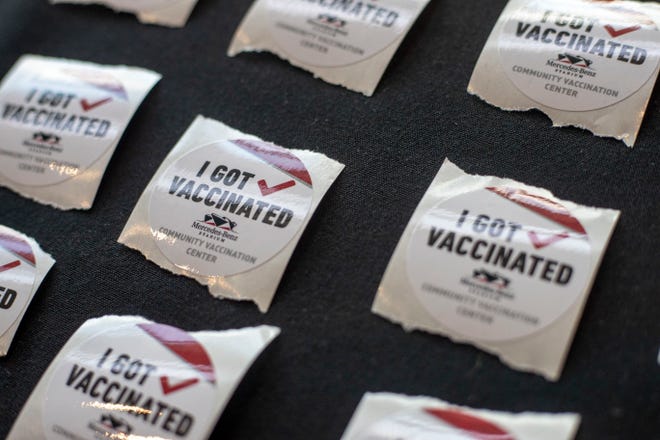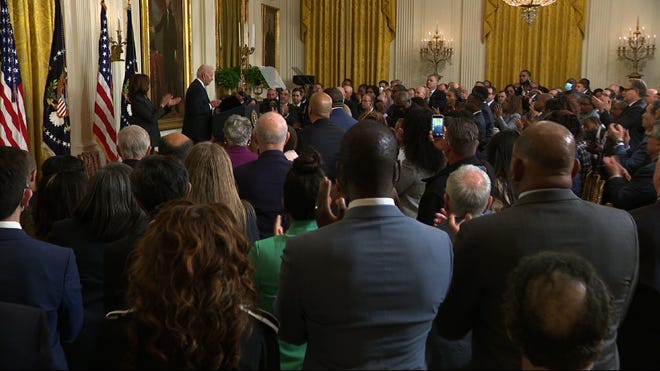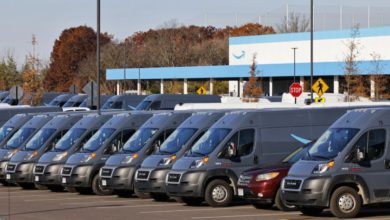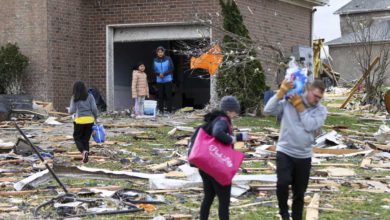
Michigan's governor has blamed the state's recent spike in cases on higher rates of travel, lower rates of mask wearing and previous success keeping cases low in the state, and experts are warning the state's rise in COVID-19 cases could be an ominous sign of things to come for the rest of the nation.
In early April, Michigan has become the worse state in the country in terms of COVID-19 cases per capita. Although the state's vaccine rollout continues, Gov. Gretchen Whitmer has said officials may consider restrictions if the community's health is compromised because more patients end up in hospital ICUs.
"Given steady relaxation of social distancing mandates and steady increases in mobility ... a repeat of the Michigan pattern in many other states is a distinct possibility," warned a policy briefing from the the University of Washington's Institute of Health Metrics and Evaluation.
The Wednesday briefing predicted COVID-19 deaths will continue to remain constant until early May but warned it is "very possible" that daily deaths can increase until mid-May as Americans travel at increasingly higher rates.
This comes as the Centers for Disease Control and Prevention released updated travel guidelines Friday for vaccinated Americans, advising travelers within the U.S. don't need to quarantine and don't need to get tested before or after their trips, unless destination requires it. Still, the agency recommended travelers continue observing precautions like social distancing and masks.
Also in the news:
►Moderna can put 50% more vaccine dosage in each vial, the Food and Drug Administration said Thursday. The company has been manufacturing 10 dose vials, but the FDA's decision allows the company to put up to 15 doses in each vial, a move that allows Moderna to speed up shipments and get more shots in arms.
►California will allow indoor concerts, theater performances and other private gatherings starting April 15, state officials announced Friday.
►Colorado will no longer require masks to be worn in most settings in the 31 counties that are on the lowest level of the state's COVID-19 dial system, Gov. Jared Polis' office announced Friday.
►Health officials in Nevada said Friday they expect a big first wave of people signing up get appointments for COVID-19 vaccinations when eligibility expands next week to everyone age 16 and older. Some will need to try more than once, they said.
? Today's numbers: The U.S. has more than 30.6 million confirmed coronavirus cases and 554,000 deaths, according to Johns Hopkins University data. The global totals: More than 130 million cases and 2.8 million deaths. At least 204 million vaccine doses have been distributed in the U.S. and 158 million have been administered, according to the CDC.
? What we're reading: COVID-19 vaccines may reduce transmission, experts say. Here's why vaccinated Americans should still wear masks in public.
USA TODAY is tracking COVID-19 news. Keep refreshing this page for the latest updates. Want more? Sign up for our Coronavirus Watch newsletter for updates to your inbox and join our Facebook group.

Florida bans businesses from requiring vaccine passports
Florida Gov. Ron DeSantis issued an executive order Friday, effective immediately, that bans businesses from requiring customers to show proof they have been vaccinated against COVID-19 in order to get service.
The executive order also bans government agencies from issuing these vaccine passports and argues that requiring such proof would "create two classes of citizens based on vaccination."
DeSantis has directed state agencies that regulate bars, restaurants, hospitals and nursing homes to ensure that businesses are complying with the order. Any business in violation will not be eligible for grants or contracts funded with state tax dollars.
Thousands die of COVID-19 amid vaccine rollout
More than 247,000 people have died of COVID-19 in the U.S. since vaccines first became available mid-December.
Officials had warned that dispensing enough vaccines to reach herd immunity would take months. And with the initial vaccine supply extremely limited and the virus running rampant across the nation over the winter, it was a sad reality that some would contract COVID-19 and die before they could be inoculated.
Charlotte Crawford of Dallas, who was fully vaccinated in January because of her job, watched her husband and two adult children contract the virus and die before they could get shots. Her husband, Henry Royce Crawford, 65, had an appointment for a vaccine when he fell ill, but her children could not find appointments.
With the Moderna and Pfizer vaccines requiring two doses, there have also been deaths during the period of weeks between the first and second shot when a recipient remains vulnerable and subject to infection.
Richard Rasmussen, 73, of Las Vegas, got his first dose of the Pfizer vaccine in early January. Yet he tested positive for the virus 10 days later and died Feb. 19 before receiving a second dose, his daughter Julie Rasmussen said.
– Associated Press
Arizona governor feuds with Phoenix over Easter park access
Gov. Doug Ducey has demanded that Phoenix open public park amenities for the Easter weekend after the Phoenix City Council voted last month to prohibit grilling and close parking lots to prevent crowding.
In a letter to Phoenix Mayor Kate Gallego on Friday, Ducey criticized the city for attempting to limit park visitors, writing that the council's decision is in violation of a statewide executive order and the advice of the U.S. Centers for Disease Control and Prevention.
Gallego responded to the governor with her own sharply worded letter, saying the city would continue with its plans and that Ducey had no legal standing to make such demands.
"This crisis has made clear to all of Arizona that you put partisan politics ahead of saving lives. It is also no surprise that you have expressed your opinion in a partisan, divisive way rather than in a genuine effort to keep our residents safe," Gallego wrote.
– Nicole Sadek, Arizona Republic
CDC announces next steps to getting cruise ships back in US waters
The U.S. Centers for Disease Control and Prevention on Friday issued the next phase of its Framework for Conditional Sailing Order, the guidance that will lead to getting cruise ships sailing again in U.S. waters.
The initial conditional sailing order came out in late October, and cruise operators have since been waiting for further guidance. In an announcement late Friday, the CDC said the second phase of the order will include trial voyages to practice new COVID-19 operational procedures with volunteers before sailing with paying passengers.
The CDC update, described in a news release as "technical guidance," also includes a requirement to increase cruise COVID-19 reporting frequency to daily. There was no clarity in the guidance, however, about when cruise ships can start sailing again in U.S. waters.
– Morgan Hines, Jayme Deerwester and Julia Thompson, USA TODAY
FDA authorizes 2 rapid coronavirus tests for home screening
Consumers will soon be able to buy rapid coronavirus tests at chain pharmacies and grocers without a prescription after the Food and Drug Administration on Wednesday authorized two home tests.
The BinaxNOW coronavirus self-test will include two tests per kit for serial screening. The no-prescription test will deliver results in 15 minutes and does not require a lab. The FDA also authorized the Quidel QuickVue coronavirus test, which delivers results in 10 minutes and also can be used without a prescription.
The FDA has authorized more than 300 coronavirus tests and technologies in what's becoming an increasingly crowded field of medical labs and tech firms touting different technologies.
The federal agency authorized only two other no-prescription home tests, but the companies that make those tests are ramping up production, and the tests not yet available to purchase. Several more tests allow people to collect nasal or saliva samples at home, but people must send samples to a lab, which delays results for one to two days.
– Ken Alltucker
Contributing: The Associated Press
Source link









